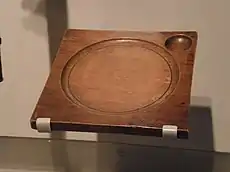trencher
English

A plate on which food is served.

A machine for digging trenches.
Etymology
From Anglo-Norman trenchour, from Old Northern French trencheor (French tranchoir), from trenchier (“to cut, to carve”). See trench (verb).
Pronunciation
- IPA(key): /ˈtɹɛntʃə(ɹ)/
- Rhymes: -ɛntʃə(ɹ)
Noun
trencher (plural trenchers)
- (archaic) A long plate on which food is served and/or cut.
- 1610, The Tempest, by Shakespeare, act 2 scene 2
- 1749, Henry Fielding, The History of Tom Jones, a Foundling. In Six Volumes, volume (please specify |volume=I to VI), London: Printed by A[ndrew] Millar, […], OCLC 928184292:
- Mrs Partridge, upon this, immediately fell into a fury, and discharged the trencher on which she was eating, at the head of poor Jenny […]
- One who trenches; especially, one who cuts or digs ditches.
- A machine for digging trenches.
Derived terms
Derived terms
- lick-trencher
- trencher cap
- trencher fly
- trencher friend
- trencher mate
- trencherman
Translations
(archaic) a long plate on which food is served
|
a machine for digging trenches
Further reading


Old French
Conjugation
This verb conjugates as a first-group verb ending in -er. In the present tense an extra supporting e is needed in the first-person singular indicative and throughout the singular subjunctive, and the third-person singular subjunctive ending -t is lost. Old French conjugation varies significantly by date and by region. The following conjugation should be treated as a guide.
Conjugation of trencher (see also Appendix:Old French verbs)
| simple | compound | ||||||
|---|---|---|---|---|---|---|---|
| infinitive | trencher | avoir trenché | |||||
| gerund | en trenchant | Use the gerund of avoir followed by the past participle | |||||
| present participle | trenchant | ||||||
| past participle | trenché | ||||||
| person | singular | plural | |||||
| first | second | third | first | second | third | ||
| indicative | jo | tu | il | nos | vos | il | |
| simple tenses |
present | trenche | trenches | trenche | trenchons | trenchez | trenchent |
| imperfect | trenchoie, trencheie, trenchoe, trencheve | trenchoies, trencheies, trenchoes, trencheves | trenchoit, trencheit, trenchot, trencheve | trenchiiens, trenchiens | trenchiiez, trenchiez | trenchoient, trencheient, trenchoent, trenchevent | |
| preterite | trenchai | trenchas | trencha | trenchames | trenchastes | trencherent | |
| future | trencherai | trencheras | trenchera | trencherons | trencheroiz, trenchereiz, trencherez | trencheront | |
| conditional | trencheroie, trenchereie | trencheroies, trenchereies | trencheroit, trenchereit | trencheriiens, trencheriens | trencheriiez, trencheriez | trencheroient, trenchereient | |
| compound tenses |
present perfect | Use the present tense of avoir followed by the past participle | |||||
| pluperfect | Use the imperfect tense of avoir followed by the past participle | ||||||
| past anterior | Use the preterite tense of avoir followed by the past participle | ||||||
| future perfect | Use the future tense of avoir followed by the past participle | ||||||
| conditional perfect | Use the conditional tense of avoir followed by the past participle | ||||||
| subjunctive | que jo | que tu | qu’il | que nos | que vos | qu’il | |
| simple tenses |
present | trenche | trenches | trenche | trenchons | trenchez | trenchent |
| imperfect | trenchasse | trenchasses | trenchast | trenchissons, trenchissiens | trenchissoiz, trenchissez, trenchissiez | trenchassent | |
| compound tenses |
past | Use the present subjunctive of avoir followed by the past participle | |||||
| pluperfect | Use the imperfect subjunctive of avoir followed by the past participle | ||||||
| imperative | – | tu | – | nos | vos | – | |
| — | trenche | — | trenchons | trenchez | — | ||
This article is issued from Wiktionary. The text is licensed under Creative Commons - Attribution - Sharealike. Additional terms may apply for the media files.